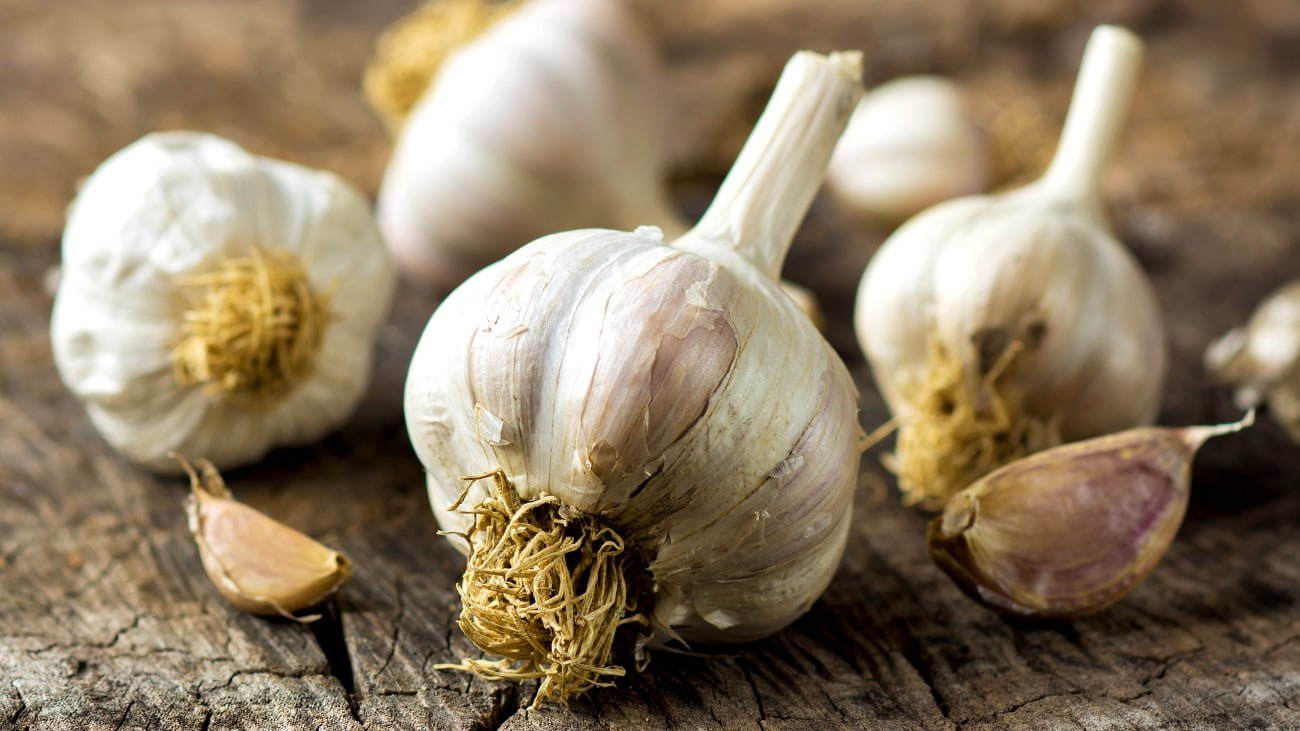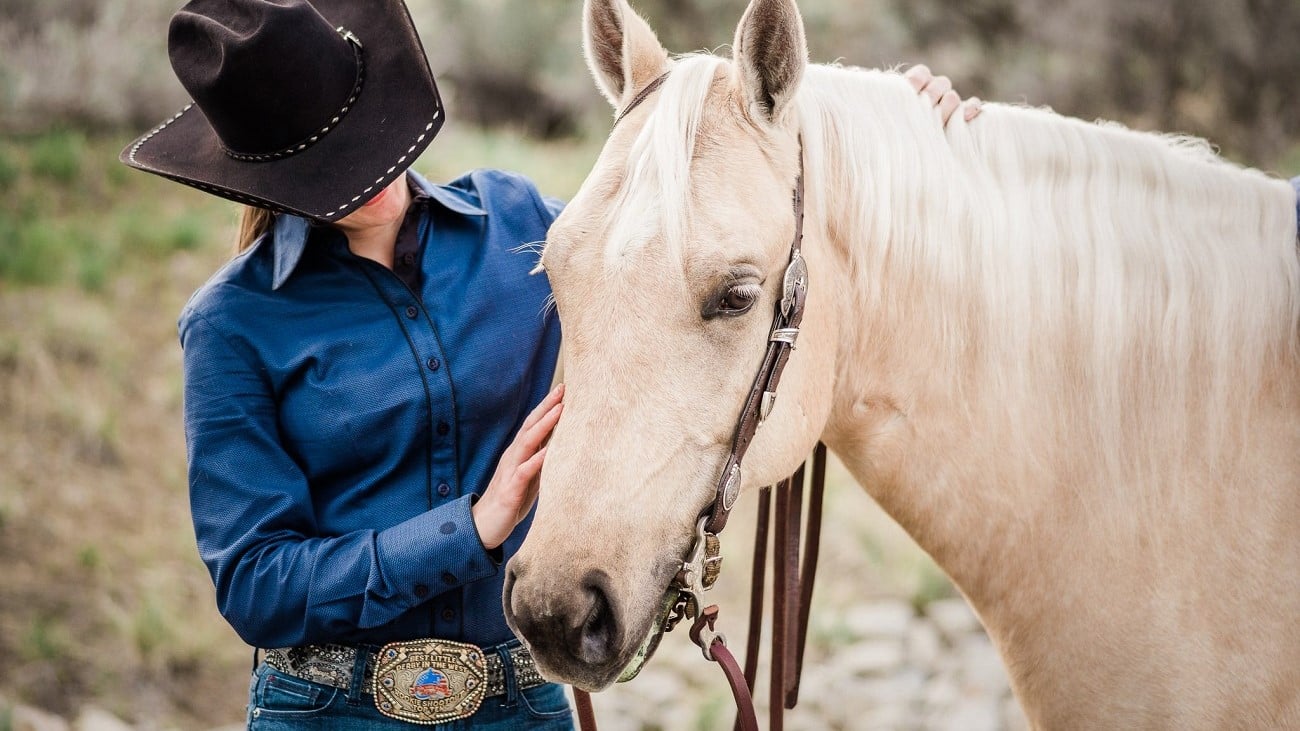Garlic for Horses: Which Form is Best to Feed?
February 23, 2023
Garlic for Horses: Which Form is Best to Feed?
Garlic is the multi-talented—and highly fragrant and flavorful—bulb from the onion family that packs a mighty punch. It's been around for ages, flavoring food and aiding humans and animals with its medicinal benefits. Garlic possesses remarkable health-promoting powers that can also help your horse—including boosting the immune system and providing natural fly control.
There are numerous forms of garlic horse supplements out there, so which is best? Are some forms of garlic more effective? And just what is garlic's secret weapon? Let's dive in and discuss the strengths and limitations of garlic in its many forms and help you decide which will best meet your horse's needs.
Can Horses Eat Garlic?
Yes, horses can eat garlic! In appropriate doses, garlic is good for horses and generally considered safe. But like most supplements—even natural ones—it should be fed with discretion. It’s important to note that feeding garlic to horses in large amounts or for extended periods can lead to Heinz body anemia, a condition that alters and removes red blood cells from the body.
Always follow manufacturer guidelines when feeding garlic supplements to ensure your horse gets the benefits without unwanted side effects. If your horse is prone to anemia or has blood clotting issues, consult your vet before feeding. Read this post for more info on how much garlic is safe to feed horses and how long to provide it.
Benefits of Garlic for Horses
So just what does garlic do for horses, and what is the secret behind its superpowers? Garlic bulbs contain a mixture of organosulfur compounds. However, Hartpury University notes allicin, also called the "heart of garlic," is the compound responsible for garlic's potent smell, flavor, and most of its therapeutic effects in humans and animals. Allicin becomes physiologically active, or "bioactive," when garlic is crushed and generally reacts positively on living organisms.
Here are some potential benefits of feeding garlic to horses:
- Aids the respiratory system
- Helps treat and prevent lung diseases and infections
- May assist with pain relief
- May lower blood pressure
- Improves gut health and good flora
- Acts as an antibacterial and antimicrobial
- Boosts immune system function
- Delivers antioxidant defense
- Garlic may be beneficial for horses with ulcers
- Acts as a natural fly repellent for horses
feeding horses garlic helps with flies
Did you know feeding garlic is an effective and natural way to repel flies on horses? Advocates have claimed for years it reduces the number of flies on livestock. In 2017, a study by Saskatchewan researchers showed cows fed garlic mineral salt had 52% fewer flies bothering them compared to the control group served regular trace mineral salt. If you want to reduce flies on your four-legged friends, including horses, consider seasoning their meals with garlic!
4 Ways of Feeding Garlic to Horses
Garlic is one of the most commonly fed herbal equine supplements. And while its benefits are many, allicin potency varies depending on the type of garlic supplement you buy and how it was processed. That means the benefits to your horse also vary depending on how the garlic was grown, the manufacturing process, and how long it has been on the shelf. Let's cover which forms are the most bioactive, stable, and potent way of feeding garlic to horses to get the most good in the safest way.

Feeding Fresh Garlic to Horses
Some horse owners use fresh garlic to supplement a horse’s diet. While this can be done, there are some important things you should know first.
Are you tossing whole cloves into your horse’s rations? Garlic must be crushed to trigger the creation of allicin. So if your horse isn’t munching and crunching those cloves before swallowing, he’s probably not getting the benefits you hoped for. Instead, crush or mince garlic finely and add it to your horse’s feed. You’ll need to feed it immediately, however, as crushed garlic begins to lose bioactive potency in just a few hours.
Also, be informed about how much you’re giving your horse. Fresh-crushed garlic doses are less scientific, and potency will vary. That means more guesswork on whether you’re feeding enough garlic or too much.
Garlic Powder for Horses
Garlic powder is made by drying and dehydrating cloves and then grinding them into fine particles. Horse garlic powder supplements are top-dressed on a horse’s feed.
While garlic powder is easier to feed than fresh-crushed, it’s far less nutritious as the active allicin is usually destroyed during the manufacturing process when heat dried. In fact, a study by Oregon State University showed that powdered garlic supplements typically do not contain active allicin. Thus, feeding garlic powder to horses may be the least effective method of supplementing.
Garlic Granules or Flakes for Horses
A common way of feeding horses garlic is granules or flakes. These supplements are usually processed through freeze-dried, air-dried, or cold-pressed dehydration. Less allicin is destroyed through these processing methods than in conventional heat-dried powdered garlic, so they may be more beneficial for your horse.
Garlic still loses potency as it sits on the shelf, so if you buy granules or flakes, ensure the product comes in a container with a tight-fitting lid to help retain potency, and resist the urge to buy in bulk.
Garlic Oil for Horses
Garlic oil is highly concentrated, which means much less is needed to gain the same benefits as other garlic forms. Oil is typically prepared using steam distillation. The garlic cloves are crushed and then steamed, and the resulting condensation contains the oil.
Garlic oil also comes in synthetic or bioidentical forms. This oil has the same flavor and organosulfur compounds contained in natural garlic. Tom McCullough—business development manager for FMF Specialty Agri Products, which creates garlic oil compounds for horse supplements—said bioidentical oil generally has a more stable shelf life and more consistent levels of bioactive compounds than other garlic forms, including steam distilled.
“There is high variability in organosulfur compounds with garlic due to the climate it’s grown in, soil type, amount of rainfall, and cultivar,” McCullough said. “We create a bioidentical garlic oil that we are constantly doing quality control on to ensure we provide customers with the same product every time.”
Both types of garlic oil are added to pellets or other coarse granules to make palatable garlic supplements for horses.
Try Redmond Garlic Salt for Horses
Daily Red Crushed Garlic and Daily Red Fortified Garlic are smart, safe, and effective choices. Both come in a loose mineral sea salt horses already love, with the added benefit of bioidentical garlic oil. Here is what sets our products apart:
- Natural sea salt triggers horses to drink more often.
- A full spectrum of essential trace minerals promotes better health.
- Our oil is 12 times more potent than garlic powder.
- Contains consistent levels of bioactive compounds.
- Longer shelf life than other garlic supplements.
- Reduces the number of flies landing on and biting horses.
- Conforms with the National Research Council’s suggestions on garlic dosages for horses. (See the table in this post to compare NRC’s guidelines and Crushed Garlic doses.)
With Redmond Daily Red garlic products, you can feel confident you are buying the best horse garlic supplements available. They provide all the benefits of natural mineral salt, plus the health-promoting and pest-repelling benefits of bioactive garlic. Click below to shop today!
Learn More
- Do flies harass your horse? Learn how to use garlic and other methods to keep flies away from horses.
- Learn which seasons to switch your horse's mineral salt to added garlic, and when to stop.
© Redmond Equine 2023. All rights reserved.
Related posts

Do You Know How Much Garlic To Feed Horses?
Garlic has many health benefits for horses, but do you know how much garlic to feed horses? Get the right amount with Redmond Rock Crushed with...
December 18, 2024

6 Tips to Keep Pesky Flies Away From Horses
Looking for ways to keep flies away from your horse? Get tips here on fly control for horses, from natural fly repellents to the best fly supplement...



